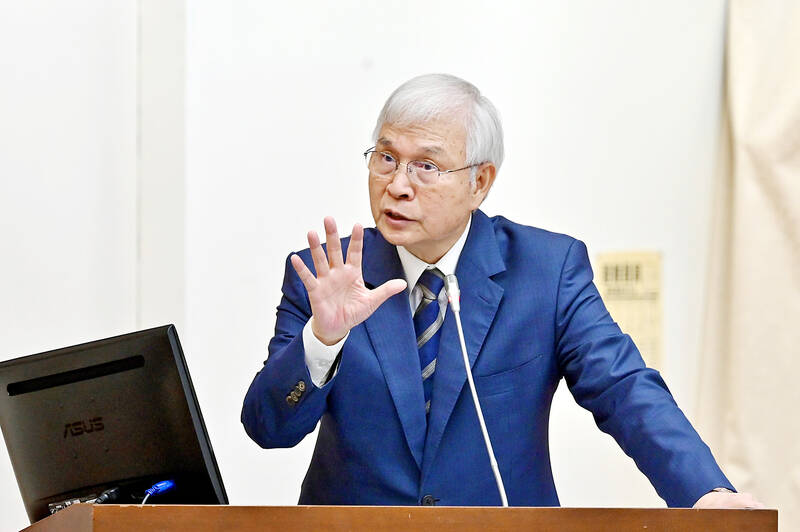The latest loan restrictions are aimed at slowing house prices and transactions, and more time is needed to see if the credit controls can achieve their intended effect, central bank Governor Yang Chin-long (楊金龍) told the legislature’s Finance Committee yesterday.
Yang explained his policy decisions while taking questions from lawmakers on the latest wave of credit controls the central bank introduced on Sept. 18.
“The housing market was overheating and mortgages growing rapidly,” Yang said, adding that real-estate lending constituted 37.5 percent of overall loans, very close to the historic high of 37.9 percent in October 2009.

Photo: George Tsorng, Taipei Times
The concentration of bank lending for properties is more serious than in 2009, he said.
A day earlier, state-run Mega International Commercial Bank (兆豐銀行), First Commercial Bank (第一銀行), Hua Nan Commercial Bank (華南銀行), Chang Hwa Commercial Bank (彰化銀行) and Taiwan Cooperative Bank (合庫銀行) told lawmakers that their real-estate loans were approaching the 30 percent limit.
All are seeking to avoid breaking the requirement by slowing reviews of mortgage applications.
“It is better for the central bank to take action and cool the market rather than wait and see a housing bubble take shape,” Yang said.
The governor said it is difficult to define a bubble, but purchases of houses on expectations of price hikes would definitely facilitate the creation of a bubble.
Taiwan should learn a lesson from the housing bubbles in Japan, the US and China, which wreaked havoc on their economies, he said, adding that China is still suffering from a slow response in the beginning and an overreaction later on.
The central bank is seeking to find middle ground by lowering the loan-to-value ratio by 10 percent for all mortgages and by denying first mortgagers grace periods if they own more than one house, Yang said.
A sizeable number of Taiwanese own two houses without the need of a mortgage, he said.
A five-year grace period where mortgagers only need to pay interest could encourage short-term property speculation, the central bank said.
The government’s favorable lending terms for first homes for self-occupancy are widely blamed for the resurgence of property fever, as they come with ultra-low interest rates of 1.775 percent, a five-year grace period and mortgage terms of up to 40 years.
The Ministry of Finance, the architect of the favorable lending terms, said that only 25 percent of buyers take advantage of the five-year period.
The central bank last week conceded and extended favorable terms to people who need to move house and those who own a second home through inheritance.
The first group has to sell their second home within a year after relocation to stay qualified, it added.
The down payment is 50 percent of assessed property value for second-home mortgages, compared with 20 percent for first-home mortgages.

Hon Hai Precision Industry Co (鴻海精密) yesterday said that its research institute has launched its first advanced artificial intelligence (AI) large language model (LLM) using traditional Chinese, with technology assistance from Nvidia Corp. Hon Hai, also known as Foxconn Technology Group (富士康科技集團), said the LLM, FoxBrain, is expected to improve its data analysis capabilities for smart manufacturing, and electric vehicle and smart city development. An LLM is a type of AI trained on vast amounts of text data and uses deep learning techniques, particularly neural networks, to process and generate language. They are essential for building and improving AI-powered servers. Nvidia provided assistance

GREAT SUCCESS: Republican Senator Todd Young expressed surprise at Trump’s comments and said he expects the administration to keep the program running US lawmakers who helped secure billions of dollars in subsidies for domestic semiconductor manufacturing rejected US President Donald Trump’s call to revoke the 2022 CHIPS and Science Act, signaling that any repeal effort in the US Congress would fall short. US Senate Minority Leader Chuck Schumer, who negotiated the law, on Wednesday said that Trump’s demand would fail, while a top Republican proponent, US Senator Todd Young, expressed surprise at the president’s comments and said he expects the administration to keep the program running. The CHIPS Act is “essential for America leading the world in tech, leading the world in AI [artificial

DOMESTIC SUPPLY: The probe comes as Donald Trump has called for the repeal of the US$52.7 billion CHIPS and Science Act, which the US Congress passed in 2022 The Office of the US Trade Representative is to hold a hearing tomorrow into older Chinese-made “legacy” semiconductors that could heap more US tariffs on chips from China that power everyday goods from cars to washing machines to telecoms equipment. The probe, which began during former US president Joe Biden’s tenure in December last year, aims to protect US and other semiconductor producers from China’s massive state-driven buildup of domestic chip supply. A 50 percent US tariff on Chinese semiconductors began on Jan. 1. Legacy chips use older manufacturing processes introduced more than a decade ago and are often far simpler than

Gasoline and diesel prices this week are to decrease NT$0.5 and NT$1 per liter respectively as international crude prices continued to fall last week, CPC Corp, Taiwan (CPC, 台灣中油) and Formosa Petrochemical Corp (台塑石化) said yesterday. Effective today, gasoline prices at CPC and Formosa stations are to decrease to NT$29.2, NT$30.7 and NT$32.7 per liter for 92, 95 and 98-octane unleaded gasoline respectively, while premium diesel is to cost NT$27.9 per liter at CPC stations and NT$27.7 at Formosa pumps, the companies said in separate statements. Global crude oil prices dropped last week after the eight OPEC+ members said they would